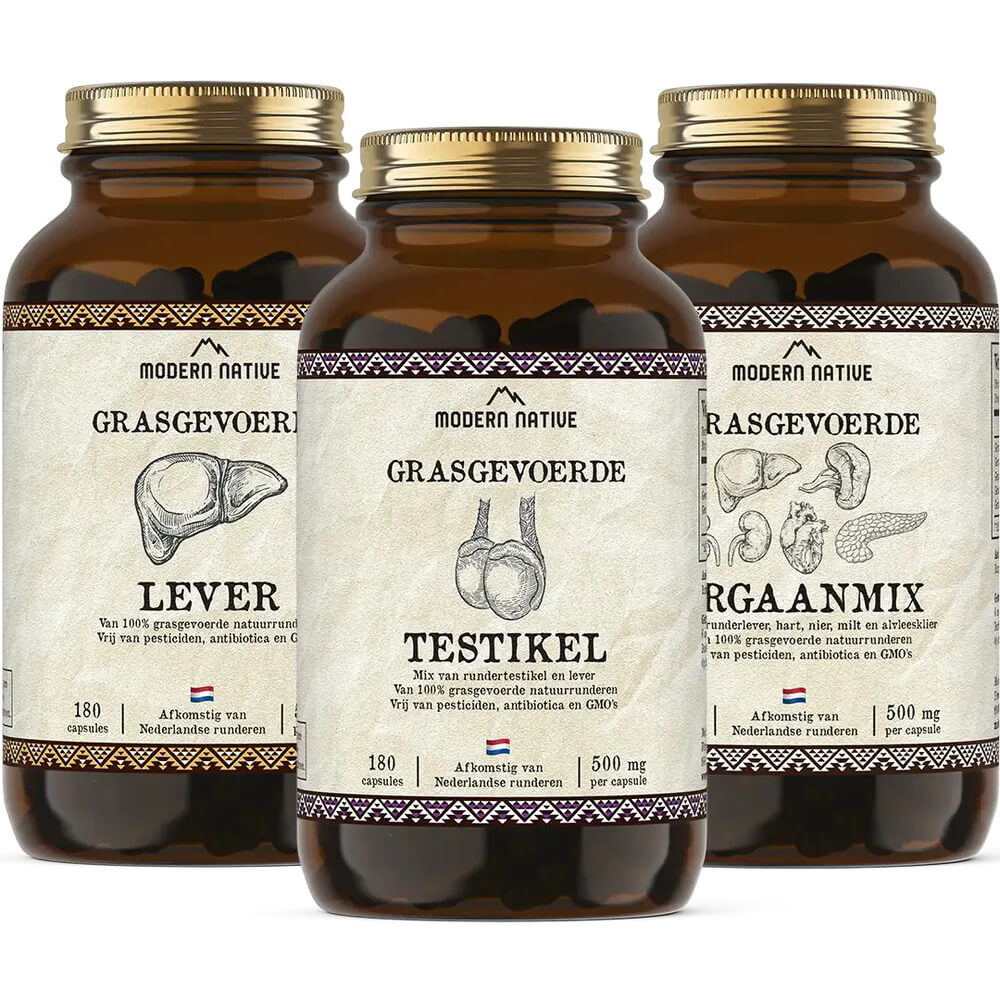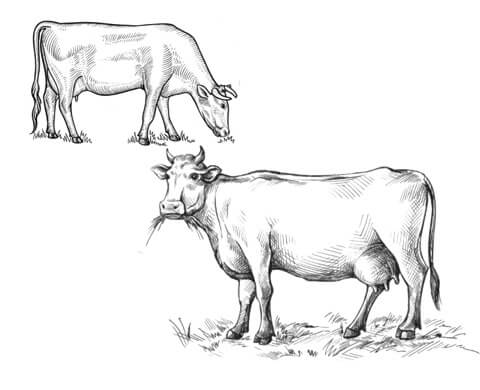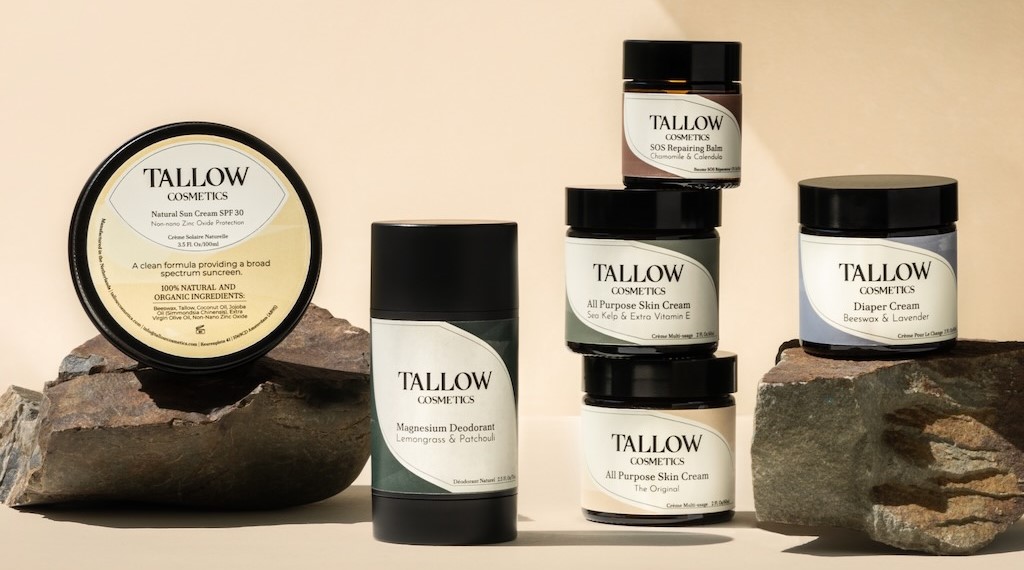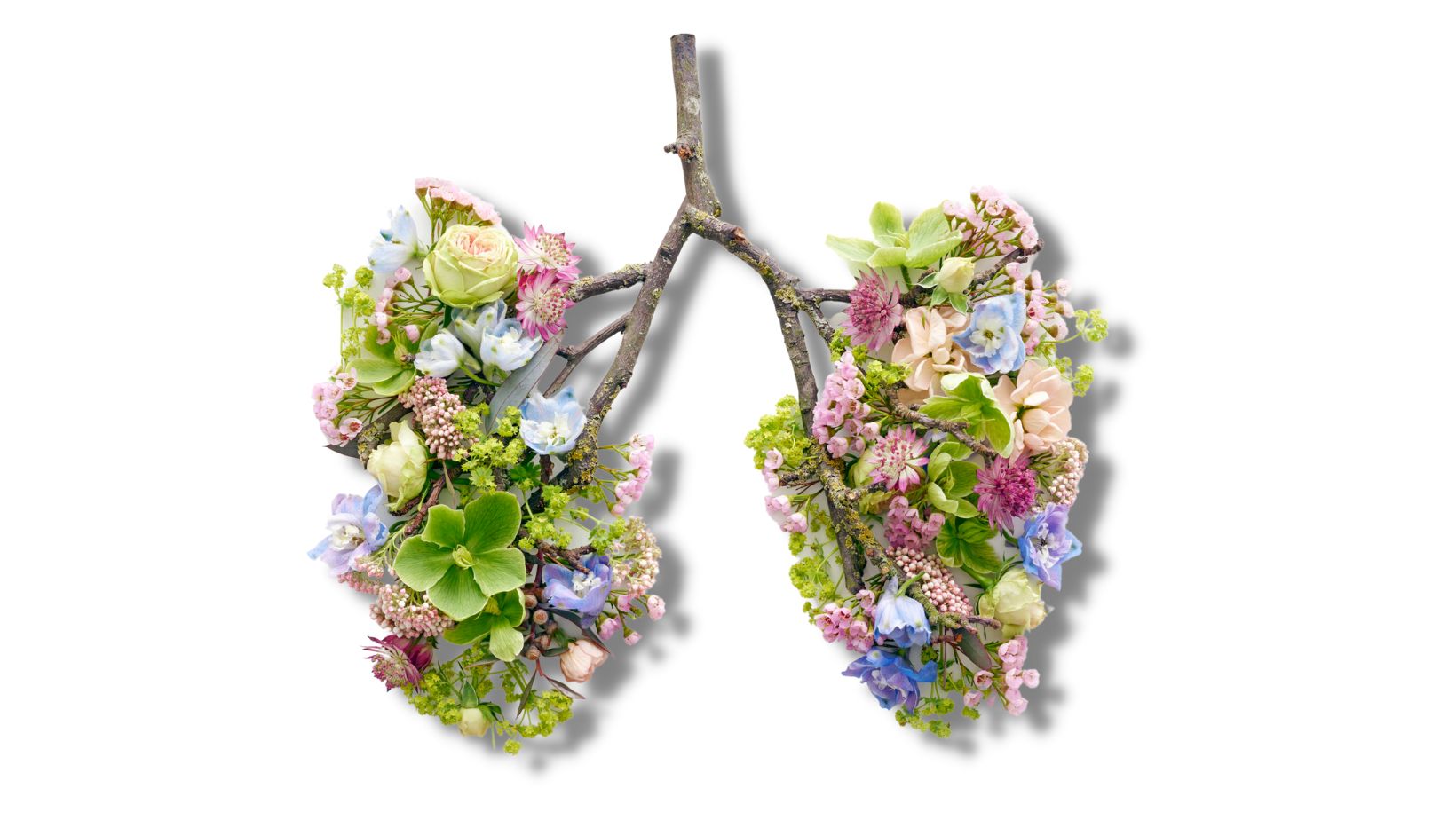Grass-fed beef lungs with liver - 180 pcs nizozemské sušené hovězí orgány v kapslích - 180 kapslí

Za nákup Vám přičteme:
+1294 Bodů do Bonusového programu
Lung strength with the help of liver in a capsule from Modern Native
Your lungs are at the forefront of immunity. Although healthy lungs are a key component of optimal health, we rarely talk about "lung nutrition".
The truth is that our lungs need certain nutrients to function at their best, and with the rising incidence of respiratory disease, airborne allergies and air pollution, it has never been more important to ensure optimal intake of key nutrients for healthy lungs.
Dried beef lungs contain unique building blocks and are a source of iron, which helps the normal transfer of oxygen in our bodies. They also provide plenty of vitamin B12, which contributes to your wellbeing.
This dietary supplement is rich in proteins, peptides, enzymes and lung-specific cofactors that support lung and respiratory health.
In addition to lung health, supplementing with dried lungs can also have a positive impact on your blood vessels and circulatory system: the lungs are a source of vascular nutrition. Thanks to molecular biologics that help DNA create healthy tissues, you can also support the health of your veins and blood vessels.
Why liver is added: In addition to lungs, these organ supplements also contain beef liver, another powerful nutrient that supports lung health, immune function, memory and mood, skin, hair, connective tissue and heart health.
Why choose organ meats from Modern Native
- It comes from 100% grass-fed cattle.
- No hormones.
- Pesticide and GMO free.
- The animals live stress-free and completely in the wild.
Ingredients
- 500 mg - freeze-dried beef lung from Dutch cattle fed only pure grass not sprayed with pesticides
- 500 mg - freeze-dried beef liver from Dutch cattle fed only pure grass not sprayed with pesticides
- Organic beef gelatin (capsules)*
*Beef gelatin capsules dissolve quickly in the stomach thanks to hydrochloric acid, regardless of whether they are taken with food or on an empty stomach. However, the contents of the capsules, i.e. lyophilized organs, may better support nutrient absorption in certain situations:
Taking with food:
-
Fat-soluble vitamins (A, D, E, K): these vitamins need fat to be absorbed, so it is ideal to take capsules with food that contains healthy fats (e.g. avocados, nuts, olive oil).
-
Prevention of discomfort: some people may experience nausea or stomach discomfort when taking capsules on an empty stomach, which food minimizes.
Taking on an empty stomach:
-
Fast absorption: water-soluble B vitamins and minerals are absorbed efficiently even without food.
-
Quick Energy: Taking capsules on an empty stomach can be useful if you are looking for a quick energy boost or to replenish nutrients during the day.
For best absorption of fat-soluble vitamins, I recommend taking the capsules with a fat-containing meal. However, if they are taken on an empty stomach and there are no digestive problems, this may also be appropriate. The choice depends on personal needs and tolerance.
It is a good idea to start with a smaller dose and watch how the capsules affect the person. If he has significant digestive problems or is unsure when and how to take it, it is definitely advisable to consult a specialist.
Dosage
-
It is recommended to take 2 capsules per day (1000 mg).
Nutritional values
|
Nutrients |
For 1 dose |
| Vitamin C | 9.2 mg (13% RDA*) |
| Vitamin B12 | 0.76 mcg (27% RDA*) |
| Selenium | 8.5 mcg (14% RDA*) |
| Iron | 1.7 mg (16% of RDA*) |
*RDA = recommended daily allowance
Sources of raw materials
- The ingredients in these food supplements come from grass-fed beef from the Netherlands.
- Because the cows are raised on natural pastures and are well cared for, the nutrients are optimally preserved and you get better quality organ meat.
- The main suppliers of organ meats for Modern Native are Zorg & Natuur (Care & Nature), Vlees van Ons (Meat from Us) and Reestdal Rund (Reestdal Beef).
Why local Dutch farms?
- This business provides a livelihood for local ecologically minded farmers.
- It creates jobs in the sector and thus supports the creation of more organic farms and ranches.
- Where there is more demand, there will be more supply. This will eventually allow the price of quality meat, including organ meat, to fall.
More local organic farmers means less traditional herds (meat production) and happier Dutch cattle.
- Money spent on farms stays in the economy, which has a domino effect and creates more jobs on other local farms.
- Shorter distribution chains reduce unnecessary transport.
- Where cattle are raised according to organic standards, the soil is healthier. Naturally grazing cattle return nutrients to the soil through the urine and manure they excrete.
Why take lungwort as a dietary supplement?
As the name suggests, the lungs have been at the centre of everything since the covid era and more and more people are suffering from post covid syndrome and its associated problems. The air quality is also not the best and respiratory problems of all kinds are therefore inevitable.
It is generally said that the organs of animals mimic the organs of humans, and therefore the easiest way to strengthen the function of the lungs as an organ is to eat beef lungs. Understandably, it won't be to most people's liking in its raw state, which is why we have freeze-dried lungs, which are easy to take and deliver the optimal dose one needs.
Like all organs, the lungs also contain important vitamins - in the case of the lungs, vitamin C, selenium and iron, and in the case of the liver, vitamin A.
Vitamins A and C in particular are crucial for the good health of your lungs and your overall health and immunity.
Vitamin A
Vitamin A is a fat-soluble vitamin involved in the expression of more than 500 genes[1].It is essential for healthy vision, cell growth, wound healing and tissue repair and has the ability to scavenge free radicals. It also plays a role in the immune system and is important for the health of mucosal and epithelial surfaces[2]
Vitamin A plays a key role in the development and differentiation of white blood cells, including lymphocytes, which fight infections, and also affects the levels of other immune system cells such as natural killer cells and cytokines such as interleukin 1.[3] Vitamin A is also important for the health of mucosal and epithelial surfaces.
Most of the vitamin A we have in our bodies is stored in the liver, but some is also stored in the retina, kidneys, adrenal glands, fat and... in the lungs (Kowalski et al., 1994). So low vitamin A levels can affect not only eye health, but also lung health and how well prepared we are to handle a respiratory infection.
There are even some indications that vitamin A deficiency may lead to an overreaction to oxidative stress in the lungs with greater production of pro-inflammatory cytokines. This is associated with bronchospasm and more severe asthma symptoms[1].
In some health conditions, including infection, low vitamin A levels appear to prevent proper tissue repair and can lead to scar tissue formation in the lungs, affecting lung health for much longer than the initial infection[1].
But before you rush out to buy vitamin A supplements, keep in mind that you can take too much of this nutrient, which can lead to toxicity. The best way to maintain your vitamin A levels is to eat a diet rich in vitamin A and avoid smoking (which depletes vitamin A).
Vitamin A is found in some foods of animal origin, such as liver, kidney, eggs and dairy products. Most of us can also make our own vitamin A from a "precursor" called beta-carotene, a pigment found in many plant foods such as dark leafy greens and brightly coloured vegetables such as beetroot, carrots and sweet potatoes.
However, if you have variants of the BCO gene (also known as BCMO1), your ability to convert beta-carotene to vitamin A may be significantly reduced (up to 60% in some people!). If you are trying to maintain good vitamin A levels, eating foods that are sources of pre-prepared vitamin A, such as beef, lamb or goose liver and salmon, can help. Vitamin A supplements and freeze-dried liver capsules are also a good way to ensure a good intake of this essential nutrient.
Even if you have a genetic polymorphism that affects your ability to convert beta-carotene to vitamin A, it's still a good idea to eat brightly coloured vegetables. Why? Because these foods are also a great source of vitamin C, another key nutrient for lung health.
Vitamin C
Vitamin C is a water-soluble antioxidant, which means it can go where vitamin A can't (and vice versa) and can help fight free radicals.
Vitamin C is also essential for immune system function - its levels are up to 100 times higher in key immune cells such as phagocytes and lymphocytes than in plasma[4]. It may also protect healthy lung tissue from reactive oxygen species produced by phagocytes during viral infection[5].
Vitamin C can also reduce bacterial activity during infection and increase levels of interferon, a protein that can prevent viruses from entering healthy cells[6]. Vitamin C also helps to increase T-lymphocyte activity, leukocyte motility and antibody production[7].
This vitamin is also essential for the healthy formation of collagen, the connective tissue that makes up much of the lung tissue. In the event of a lung infection, you will need sufficient vitamin C to support healthy collagen production and minimise the formation of scar tissue (fibrosis) in the lungs, which has a long-term detrimental effect on lung health.
Sources:
https://bodyecology.com/articles/nutrients-for-healthy-lungs/
[1] Timoneda J, Rodríguez-Fernández L, Zaragozá R, et al. (2018). Vitamin A Deficiency and the Lung. Nutrients, 10(9):1132. doi:10.3390/nu10091132
[2] Stargrove, M.B., & Stargrove, L.B. (2008). Herb, nutrient and drug interactions: clinical implications and therapeutic strategies. St. Louis, Missouri: Mosby Elsevier.
[3] Food and Nutrition Board, Institute of Medicine. (2002). Dietary Reference Intakes for Vitamin A, Vitamin K, Arsenic, Boron, Chromium, Copper, Iodine, Iron, Manganese, Molybdenum, Nickel, Silicon, Vanadium, and Zinc. Washington, DC: National Academy Press, 2000. Available at: https://www.ncbi.nlm.nih.gov/books/NBK222310/
[4] Hemilä H. (1997). Vitamin C intake and susceptibility to the common cold. Br J Nutr, 77:59-72.
[5] Hemilä H, Herman Z. (1995). Vitamin C and the common cold: a retrospective analysis of Chalmers' review. J Am Coll Nutr. Apr;14(2), 116-23.
[6] Iqbal K, Khan A, Khattak M. (2004). Biological significance of ascorbic acid (vitamin C) in human health - A review. Pakistan J of Nutr, 3(1):5-13.
[7] Leibovitz B, Siegel BV (1981). Ascorbic acid and the immune response. Adv Exp Med Biol, 135:1-25.
Read more on this topic
Additional parameters
| Category: | Dried organs (offal) |
|---|---|
| EAN: | 8720589464186 |
| Výrobce: | Modern Native B.V. Flevolaan 10, 9501 VG, Stadskanaal, The Netherlands |
| Země původu: | Nizozemsko |
| Proč koupit: | Nizozemská firma, která vyrábí a prodává vysoce kvalitní doplňky stravy. Jsou jimi koncentrované a lyofilizované orgány v kapslích. Jejich posláním je přinášet moudrost našich předků zpět do moderního světa, pro optimální zdraví. |
| Vhodné pro: | Bez lepku-Sugar Free-Soy Free-GMO Free-Low Carb-Keto-Paleo |
Be the first who will post an article to this item!
Be the first who will post an article to this item!

Our ancestors lived differently from us. Traditional societies have been eating organ meat for centuries. They did it for a reason. Intuitively, they knew it was good for them. They knew that organ meats were the source of the most important nutrients. Similarly, in nature many predators go after organ meat first and muscle meat second.
We hardly eat organs these days. It's an ancient tradition that has faded away. Modern Native's mission is to bring the wisdom of our ancestors back to the modern world for optimal health, strength and happiness.
There is no organ meat like meat
Not all organs are the same. When looking for quality (organ) meat, it is important to check several points:
- 100% grass-fed cattle
- Without hormones
- Pesticide and GMO free
- Animals live stress-free and completely in the wild
The term "grass-fed" doesn't tell the whole story. The cow may be partially outside in the summer eating fresh grass, while most of the time she is in the barn and fed concentrate. 100% grass-fed, that's the Modern Native way of doing things. They only work with farmers whose cattle meet the above points. The organs are obtained from cattle in the Netherlands.

Why local cattle?
- It maintains the health of local natural farmers and creates jobs in the industry, thus creating more natural farmers in the Netherlands.
- Where there is more demand, there will be more supply. This will eventually allow the price of quality meat, including organ meat, to fall.
- More local natural farmers means fewer traditional herds (mass production) and happier cattle.
- Money spent on local farms stays in the economy, which has a domino effect and creates more jobs.
- Shorter distribution chains reduce unnecessary transport.
- When there are more natural livestock, healthier soil is created.
- Naturally grazing cattle return nutrients to the soil through the urine and manure they excrete.

Method for Modern Native accessories
- It comes from 100% grass-fed cattle.
- No hormones.
- Pesticide and GMO free.
- The animals live stress-free and completely in the wild.
Why eat organ meat?
Beloved by our ancestors
Traditional peoples, Native Americans, and ancient ancestors believed that consuming the organs of a healthy animal would promote the health of the individual's organ. They ate "from head to tail", i.e. everything from the animal, because they intuitively knew how nutritionally rich the meat from the organs was.


.jpg)



























































_small.jpg)


















